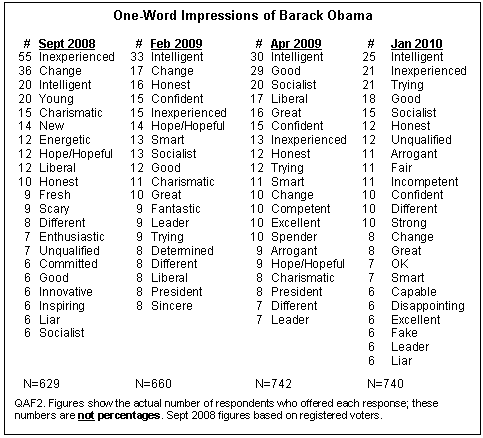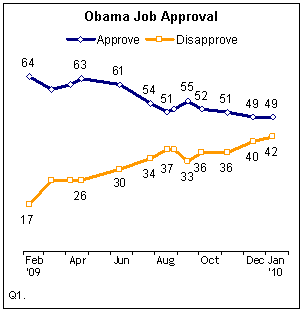 As he approaches the end of his first year in office, a 49% plurality of the public approves of the way Barack Obama is handling his job as president, while 42% d
As he approaches the end of his first year in office, a 49% plurality of the public approves of the way Barack Obama is handling his job as president, while 42% d
isapprove. This is largely unchanged from a 49% to 40% margin a month ago. Over the past year, Obama has seen his approval rating decline by 15 points from a high of 64% in February 2009, just after taking office. Disapproval has risen even more noticeably, up 25 points from 17% last February.
Obama’s approval ratings have continued to slip in recent months among independents – from 54% as recently as September to 39% today. For the first time in Pew Research Center polling, significantly more independents disapprove of Obama’s job performance (49%) than approve (39%).
This slide among independents has been counterbalanced,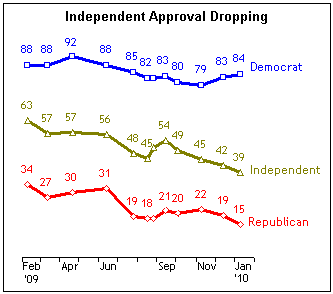 somewhat, by a small recovery in approval among Democrats. Democratic job approval had fallen to an all time low of 79% in November, and now stands at 84%. Republican job approval has reached an all-time low of 15%.
somewhat, by a small recovery in approval among Democrats. Democratic job approval had fallen to an all time low of 79% in November, and now stands at 84%. Republican job approval has reached an all-time low of 15%.
Strong Feelings on Both Sides
In the current survey, as many Americans strongly disapprove of Obama as strongly approve (30% each). As Obama’s overall approval rating has fallen, the balance of strong approval vs. strong disapproval has drawn even. In April of 2009, strong approval outweighed strong disapproval by a 45% to 18% margin.
Since April, Democrats have become 22 points less likely to say they very strongly approve of the president’s job performance (from 79% to 57%). Over the same period of time, Republicans have become 19 points more likely to say they strongly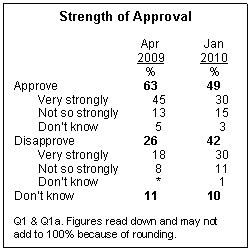 disapprove of Obama (from 42% to 61%). Similarly, strong disapproval is up 17 points among independents; and reflecting their overall approval ratings, more independents strongly disapprove of Obama (35%) than strongly approve (22%).
disapprove of Obama (from 42% to 61%). Similarly, strong disapproval is up 17 points among independents; and reflecting their overall approval ratings, more independents strongly disapprove of Obama (35%) than strongly approve (22%).
Obama’s strongest support continues to come from liberal Democrats – 90% approve and 70% do so very strongly, down from 95% and 88%, respectively, last April. African Americans, too, continue to back Obama strongly, with 88% approving of his performance down only slightly from 96% last April. Nearly three-quarters of blacks (73%) continue to very strongly approve of Obama’s performance, down from 89% last April.
Approval on Issues
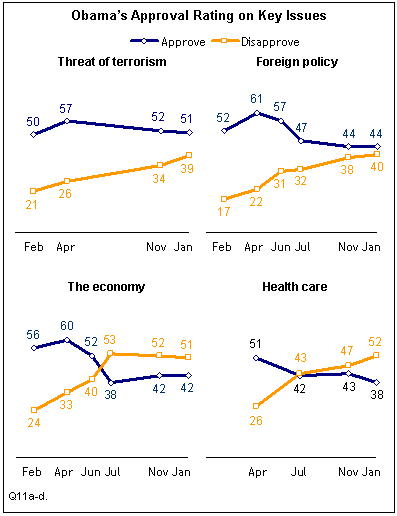
Obama receives mixed reviews when it comes to his handling of leading issues. Roughly half (51%) approve of how he is handling the threat of terrorism; though disapproval has ticked up to 39%, from 34% last November and 26% in April. When it comes to foreign policy generally, more approve than disapprove by a slim 44% to 40% margin. Here again, approval has remained relatively level over the past six months, while disapproval has inched up from 32% in July.
When it comes to the key issues on the domestic front, there is more disapproval than approval. Roughly half (51%) disapprove of Obama’s handling of the economy while 42% approve. Obama’s approval ratings on the economy have been flat since July. In addition, 58% disapprove of Obama’s handling of the federal budget deficit – the highest level of disapproval for any issue tested; just 32% approve of Obama’s performance on the budget deficit.
Views of how Obama is handling health care policy have steadily declined since the summer; in July about as many approved (42%) as disapproved (43%) of Obama’s handling of health care. Today, 52% disapprove while 38% approve.
Domestic Policies Most Divisive
These key domestic issues also garner the most partisan reaction among the public. Nearly seven-in-ten (68%) Democrats approve of Obama’s handling of the economy, compared with only 14% of Republicans – a 54-point partisan gap. The division is almost identical when it comes to health care, where 64% of Democrats and just 10% of Republicans approve of Obama’s performance. On both issues, most independents disapprove (58% on the economy, 56% on health care), with only about a third (35% and 34%, respectively) approving.
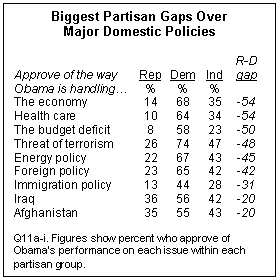 On foreign policy issues – specifically the situations in Iraq and Afghanistan – partisan differences in opinion are more modest. Fewer Democrats approve of Obama on Iraq (56%) and Afghanistan (55%) than they do for his handling of the economy and health care. Republicans, however, rate Obama more favorably on Iraq (36%) and Afghanistan (35%) than they do for any domestic issue. As a result, a 54-point approval gap between Republicans and Democrats on both the economy and health care shrinks to 20 points when it comes to Afghanistan and Iraq.
On foreign policy issues – specifically the situations in Iraq and Afghanistan – partisan differences in opinion are more modest. Fewer Democrats approve of Obama on Iraq (56%) and Afghanistan (55%) than they do for his handling of the economy and health care. Republicans, however, rate Obama more favorably on Iraq (36%) and Afghanistan (35%) than they do for any domestic issue. As a result, a 54-point approval gap between Republicans and Democrats on both the economy and health care shrinks to 20 points when it comes to Afghanistan and Iraq.
Of the nine issues tested, independents do not offer majority approval for Obama’s handling of any single issue. Independents are particularly dour when it comes to Obama’s handling of the budget deficit: just 23% approve while 66% disapprove. Independents reserve their highest approval ratings for Obama’s handling of terrorists threats: 47% approve, while 43% disapprove.
Obama’s Personal Characteristics
On balance, Obama’s personal ratings remain positive. Broad majorities view him as a good communicator (83%), warm and friendly (77%), well organized (70%), and well informed (69%). Most also say that Obama is someone who cares about people like me (64%), is a strong leader (62%), trustworthy (61%), and able to get things done (57%).
There has been little overall change in views of Obama’s personal characteristics since September 2009. Nonetheless, 61% of independents say Obama is someone who cares about people like me, down 10 points from September. Despite some slippage, most independents continue to evaluate Obama’s personal traits positively.
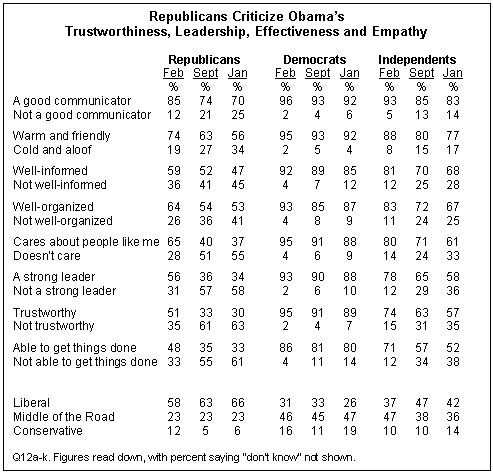
Republicans take a more mixed view of Obama’s traits. While majorities acknowledge that he is a good communicator (70%), warm and friendly (56%), and well organized (53%), they are more critical of other personal dimensions. Most say Obama strikes them as not trustworthy (63%), someone who is not able to get things done (61%), and not a strong leader (58%). Also, Republicans are much more likely to say Obama is liberal (66%) than are independents (42%) or Democrats (26%).
Democrats remain nearly unanimously positive in their view of Obama’s personal traits. At least eight-in-ten offer a positive response for all eight pairs of phrases tested. Fully 92% call him a good communicator and 88% say he is a strong leader.
Cautious or Impulsive?
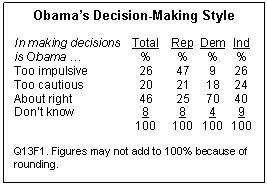 When asked to assess the way in which Obama makes important decisions, a plurality (46%) says his decision-making style is about right, 26% say he is too impulsive in making important decisions, and 20% say he is too cautious. Among Republicans, the critique of how Obama makes important decisions is that he is too impulsive (47%) rather than too cautious (21%); a quarter of Republicans says he does about right. Most Democrats say Obama’s decision making is about right (70%), but to the extent that there is a critique, it is that he is too cautious (18%) rather than too impulsive (9%). Independents split about evenly between too impulsive (26%) and too cautious (24%), with a 40% plurality saying he handles things about right.
When asked to assess the way in which Obama makes important decisions, a plurality (46%) says his decision-making style is about right, 26% say he is too impulsive in making important decisions, and 20% say he is too cautious. Among Republicans, the critique of how Obama makes important decisions is that he is too impulsive (47%) rather than too cautious (21%); a quarter of Republicans says he does about right. Most Democrats say Obama’s decision making is about right (70%), but to the extent that there is a critique, it is that he is too cautious (18%) rather than too impulsive (9%). Independents split about evenly between too impulsive (26%) and too cautious (24%), with a 40% plurality saying he handles things about right.
Long-Term Prospects
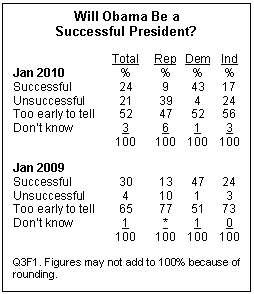 One year into his first term, a 52% majority of the public says it is too early to tell whether Obama will be a successful or unsuccessful president. Of those who offer an expectation, about as many say he will be successful (24%) as say he will be unsuccessful (21%). One year ago, 65% said it was too early to tell; 30% thought Obama would be a successful president and 4% thought he would be unsuccessful.
One year into his first term, a 52% majority of the public says it is too early to tell whether Obama will be a successful or unsuccessful president. Of those who offer an expectation, about as many say he will be successful (24%) as say he will be unsuccessful (21%). One year ago, 65% said it was too early to tell; 30% thought Obama would be a successful president and 4% thought he would be unsuccessful.
The plurality or majority opinion among Republicans (47%), Democrats (52%) and independents (56%) is that it is too early to tell whether or not Obama will be successful. Not surprisingly, Democrats are more likely to say that he will be successful (43%) rather than unsuccessful (4%), which is about how Democrats felt a year ago. The balance is reversed among Republicans (39% unsuccessful, 9% successful) – last January just 10% of Republicans though Obama would be unsuccessful. Expectations among independents are more mixed: 17% think that in the long run Obama will be a successful president, 24% say unsuccessful. A year ago, 24% of independents thought Obama would ultimately be successful, and just 3% said unsuccessful.
Obama in a Word
Intelligent continues to be the one word most frequently used to describe Obama, with 25 people offering it as their top-of-the-mind description of the president. Other words that people offer when asked to describe Obama in a single word include inexperienced and trying (21 mentions each); the number of people volunteering these words has increased since April 2009 when 13 people said inexperienced and 12 said trying.
Other frequently mentioned positive words include good, honest, confident and strong. On the negative side, socialist, unqualified, arrogant and incompetent come to mind when people are asked to think about their one word impression of Obama.
